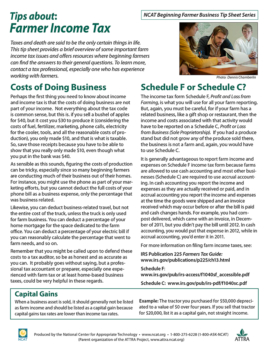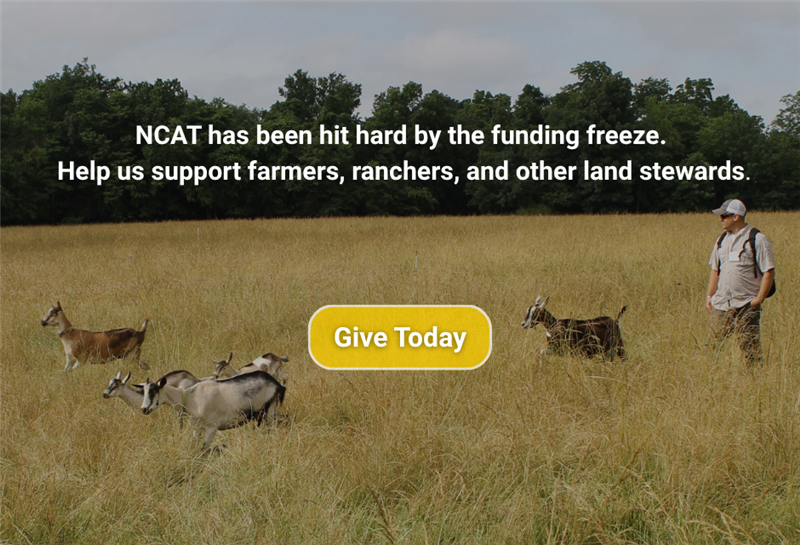Tips about: Farmer Income Tax
NCAT Beginning Farmer Business Tip Sheet Series
By Guy Ames, NCAT Agriculture Specialist
Taxes and death are said to be the only certain things in life. This tip sheet provides a brief overview of some important farm income tax issues and offers resources where beginning farmers can find the answers to their general questions. To learn more, contact a tax professional, especially one who has experience working with farmers.
Costs of Doing Business
Perhaps the first thing you need to know about income and income tax is that the costs of doing business are not part of your income. Not everything about the tax code is common sense, but this is. if you sell a bushel of apples for $40, but it cost you $30 to produce it (considering the costs of fuel, fertilizer, marketing, phone calls, electricity for the cooler, tools, and all the reasonable costs of production), you only made $10, and that is what is taxable. So, save those receipts because you have to be able to show that you really only made $10, even though what you put in the bank was $40.
As sensible as this sounds, figuring the costs of production can be tricky, especially since so many beginning farmers are conducting much of their business out of their homes. For instance, you might use the phone as part of your marketing efforts, but you cannot deduct the full costs of your phone bill as a business expense, only the percentage that was business related.
Likewise, you can deduct business-related travel, but not the entire cost of the truck, unless the truck is only used for farm business. You can deduct a percentage of your home mortgage for the space dedicated to the farm office. You can deduct a percentage of your electric bill if you can reasonably calculate the percentage that went to farm needs, and so on.
Remember that you might be called upon to defend these costs to a tax auditor, so be as honest and as accurate as you can. It probably goes without saying, but a professional tax accountant or preparer, especially one experienced with farm tax or at least home-based business taxes, could be very helpful in these regards.
Schedule F or Schedule C?
The income tax form Schedule F, Profit and Loss from Farming, is what you will use for all your farm reporting. But, again, you must be careful, for if your farm has a related business, like a gift shop or restaurant, then the income and costs associated with that activity would have to be reported on a Schedule C, Profit or Loss from Business (Sole Proprietorship). If you had a produce stand but did not grow any of the produce sold there, the business is not a farm and, again, you would have to use Schedule C.
It is generally advantageous to report farm income and expenses on Schedule F income tax form because farms are allowed to use cash accounting and most other businesses (Schedule C) are required to use accrual accounting. In cash accounting you report the income and expenses as they are actually received or paid, and in accrual accounting you report the income and expenses at the time the goods were shipped and an invoice received which may occur before or after the bill is paid and cash changes hands. For example, you had compost delivered, which came with an invoice, in December of 2011, but you didn’t pay the bill until 2012. In cash accounting, you would put that expense in 2012, while in accrual accounting, you’d enter it in 2011.
For more information on filing farm income taxes, see:
Capital Gains
When a business asset is sold, it should generally not be listed as farm income and should be listed as a capital gain because capital gains tax rates are lower than income tax rates.
Example: The tractor you purchased for $50,000 depreciated to a value of $0 over four years. If you sell that tractor for $20,000, list it as a capital gain, not straight income.
Farmer or Hobbyist?
Quite a few beginning farmers worry that if they don’t make a profit in “any three of five consecutive years,” the IRS might deem them a hobby farm, and they will lose the (few) tax advantages of being a farmer.
However, the failure to meet the three-out-of-five profit test does not automatically make the activity a hobby; it only allows the IRS to look deeper into the venture. If the IRS can prove that the operator has no intent to make a profit or is attempting to generate tax losses to offset other taxable income, it is then assumed the activity is a hobby and all deductions in excess of income are disallowed.
The truth is, there are nine factors set forth in the IRS regulations to be used as guidelines to make the judgment of whether you are a farmer. All nine of these guidelines have as their basis your intent to make a profit as a farmer. Essentially, if you can show that it is your intent to make a profit farming, then you are a farmer for tax purposes, regardless of how many years it takes you to turn a profit.
For more information on the nine guidelines and other farm tax issues, go to www.ruraltax.org, a nonprofit information source run by several land-grant universities.
Depreciation
Depreciation is the depleted value of an asset with an expected useful life of more than one year. To calculate depreciation, divide the price you paid for the product by its expected useful lifespan. This method allows you to spread the costs of the item over the span of years you plan to use it. For tax purposes, however, it is allowable to depreciate an item much faster than it actually wears out. This option allows you to reduce your farm income tax liability up front. It’s explained in Section 179 of the IRS Tax Code.
The number of years that you must take to depreciate an asset and how you can claim it in those years (e.g., straight line, accelerated, section 179, etc.) depends on the asset class of the property in question and the characteristics of the farm. IRS Publication 225 Farmers Tax Guide explains these and other details.
If the asset is not held for more than one year, it cannot be depreciated. Buildings can be depreciated but land cannot. The only instance when land can be depreciated is if it is logged or mined and it can be proven that the asset value has been depleted.
Other Tax Benefits of Being a Farmer
No record keeping for farm vehicles. Farmers may deduct up to 75 percent of their farm vehicle expenses as qualified business expenses without business record substantiation (a log). This safe harbor is helpful to beginning farmers and ranchers. This is available for all farming income. The activities must fall within the definition of a farm as previously discussed.
Averaging farm income over years. Individual taxpayers who qualify as being a farmer under IRS Section 1301 may average their farm income. This provides for the opportunity to “level” income tax liabilities over a period of years. The usefulness of this provision depends upon the individual circumstances of a particular taxpayer’s situation.
Farm Income Tax Resources
- Fearless Farm Finances: Farm Financial Management Demystified is a very useful book published in 2011 by
the Midwest Organic and Sustainable Education Service (MOSES). (See Marbleseed formerly known as MOSES). - www.RuralTax.org is a nonprofit organization funded by the USDA’s Risk Management Agency.
- Farm, Farming, and Who’s a Farmer for Tax Purposes. 2010.
- Farm Income Taxation. 1998.
- Small Farm and Ranch Income Taxes is a section of the Beginning Farmer Rancher Resources website.
- IRS Publication 225 Farmers Tax Guide
Tips about Farmer Income Tax
By Guy Ames, NCAT Agriculture Specialist
© 2013 National Center for Appropriate Technology
IP450
This publication is produced by the National Center for Appropriate Technology through the ATTRA Sustainable Agriculture program, under a cooperative agreement with USDA Rural Development. This publication was also made possible in part by funding from the National Institute of Food and Agriculture, Beginning Farmers and Ranchers Development Program (BFRDP), Award 2015-70017-22868, part of a subcontract administered by UC Berkeley and USDA/NIFA /OASDFR. ATTRA.NCAT.ORG.


